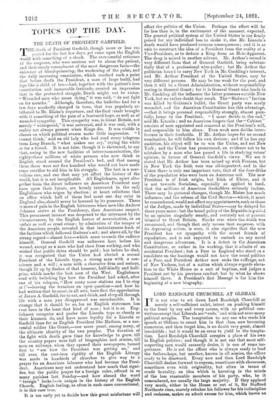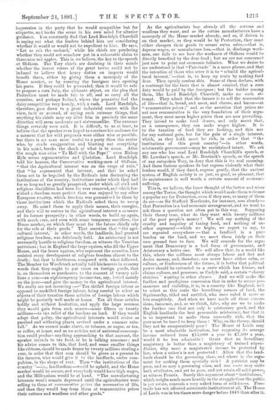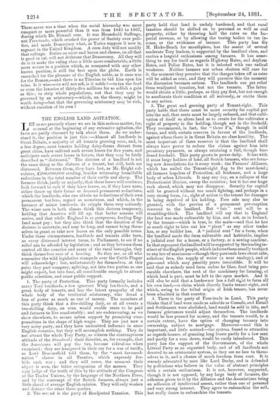LORD RANDOLPH CHURCHILL AT OLDHAM.
IT is not wise to set down Lord Randolph Churchill as merely a self-sufficient cadet, intent on pushing himself to the front by any and every means, with no political con- victions except that Liberals are "cads," and with not over-many political scruples. The temptation to any one who reads his speech at Oldham to count him in that class, now becoming numerous, and then forget him, is no doubt very great, almost irresistible ; but it would be an error to yield to the tempta- tion. Lord Randolph Churchill occupies a place of his own in English politics ; and though it is not one that most self- respecting men would earnestly desire, it is one of some im- portance. He is not the officer who is always ready to lead the forlorn-hope, but another, known in all armies, the officer ready to be disowned. Every now and then Lord Randolph Churchill dashes forward to express, sometimes with cleverness, sometimes even with originality, but often in terms of crude brutality, an idea which is hovering in the minds of the less reasonable members of his party, who, be it remembered, are usually the large majority. If they applaud very much, either in the House or out of it, Sir Stafford Northcote rises, suavely rebukes his follower for his indiscipline and rashness, makes an adroit excuse for him, which leaves an impression in the party that he would sympathise but for etiquette, and books the scene in his own mind for ulterior guidance. You constantly find that Lord Randolph Churchill is saying out what the leaders behind him are considering whether it would or would not be expedient to hint. He says, " Let us rob the orchard," while his chiefs are pondering whether they could not somehow put in a colourable claim to those nice red apples. This is, we believe, the key to the speech :at Oldham. The Tory chiefs are doubting in their minds whether the lowest voters of the great towns could not be induced to believe that heavy duties on imports would benefit them, either by giving them a monopoly of the Home market, or by coercing the foreigner into opening 'his ports. If they could be persuaded, then it would be safe -to propose a corn duty, the ultimate object, on the plea that Protection must be made fair to all, and so carry all the .counties, and perhaps Ireland, where the peasantry feel the dairy competition very keenly, with a rush. Lord Randolph, -therefore, goes down to a great industrial centre with the Tiew, tacit or avowed, of saying such extreme things, that anything his chiefs may say after him in precisely the same • direction will seem moderate and statesmanlike. The extreme things certainly were said. It is difficult, to us at least, to believe that the speaker even hoped to convince his audience for -a moment that his wild proposals were either wise or possible, but there is no man more useful to a party than the orator who, by crule exaggeration and blurting out everything in his mind, breaks the shock of what is to come. After the rough who cries " To Hell with the Pope!" even Bishop Ryle seems argumentative and Christian. Lord Randolph -told his hearers, the Conservative working-men of Oldham, " that the Agricultural interest was on the verge of ruin," that "he represented that interest, and that he asked them not to be beguiled by the Radicals into destroying the institutions of the country, institutions under which they had for so long and so greatly prospered, under which all civil and religious disabilities had been for ever removed, and which fur- nished a freedom more perfect than was enjoyed by any other European country, which freedom was guaranteed to them by those institutions which the Radicals asked them to sweep away. He askel them to apply their means, their energies, and their will to restore to the agricultural interest a measure -of its former prosperity ; in other words, to build up again, with much care, and even with some temporary sacrifices, the Home market, on which they must for the future chiefly rely for the sale of their goods." That assertion that "the agri- cultural interest," in other words, the landlords, had granted religious freedom, was deliciously bold. An aristocracy is not necessarily hostile to religious freedom, as witness the Venetian patricians ; but in England the large squires, who fill the Upper House, and the lesser squires, who represent the counties, have resisted every development of religious freedom almost to the -death; but that is feebleness, compared with what followed. The Member for Woodstock actually told his hearers in so many words that they ought to put taxes on foreign goods, that is, on themselves as purchasers, to the amount of twenty mil- lions a year—an eighteenpenny income-tax, say, levied mainly -on the poor—and give the money to the agricultural interest. We really are not inventing :—" Tax skilled foreign labour as ,opposed to unskilled foreign labour, being careful to select as objects of their taxation those articles of foreign labour which might be perfectly well made at home. Tax all those articles boldly and without hesitation, and apply the large revenue they would gain from such source—some fifteen or twenty millions—to the relief of the burdens on land. If they would :adopt that policy, the agricultural interests would revive as parched and withering plants revived under a summer rain- fall." As we cannot make claret, or tobacco, or sugar, or tea, or coffee, at home, and as no articles not of universal consump- tion could produce anything approaching to that amount, the speaker intends to tax food, or he is talking nonsense ; and his advice comes to this, that food, and some smaller things like ribbons, should be made dearer by twenty millions sterling a year, in order that that sum should be given as a present to • the farmers, who would give it to the landlords, under com- pulsion, in the shape of rent. Then "the institutions of the country "—i.e., landlordism—would be upheld, and the Home market would be secure, and everybody would have high wages, and the Millennium would be at hand. "The manufacturing interests would remain depressed until the agriculturists were selling to them at remunerative prices the necessaries of life, and then they would buy from them at remunerative prices their cottons and woollens and other goods."
As the agriculturists buy already all the cottons and woollens they want., and as the cotton manufacturers have a monopoly of the Home market already, and as, if driven in on that market, as they would be by Protection, they must either cheapen their goods to secure extra sales,—that is, depress wages, or manufacture less,—that is, discharge work- men, one fails to see how the workmen of Oldham would be directly benefited by the dear food ; but we are not concerned just now to point out economic fallacies. What we desire to see understood is that "Fair-trade" is a mere phrase, and that the intention of those who utter it is to " rebuild the agricul- tural interest,"—that is, to keep up rents by making food dear. They openly confess this. Some of them declare, with a contempt for the facts that is almost comical, that a corn duty would be paid by the foreigner ; but the bolder among them, like Lord Randolph Churchill, make no such at- tempt. They admit that the farmer is to sell the necessaries of life—that is, bread, and meat, and cheese, and bacon—at "remunerative prices ;" and as the assertion that prices are not now remunerative is the very foundation of their argu- ment, they must mean higher prices than are now prevailing. They intend to make food dearer, and only assert that, as a consequence, they can make wages higher. It is to the taxation of food they are looking, and this not for any national gain, but for the gain of a single interest, which, as they hold, must be rich, in order that institutions of this great country "—in other words, aristocratic government—may be maintained intact. We ask any one who has read Lord Randolph Churchill's speech, or Mr. Lowther's speech, or Mr. Bentinck's speech, or the speech of any outspoken Tory, to deny that this is its real meaning. And these furious speakers do but express violently what their leaders would, if they dared, express gently, that the ancient system of English society is so just, so good, so pleasant, that its maintenance is well worth a certain amount of economic suffering.
This is, we believe, the inner thought of the better and wiser among the Tories, the thought which would make them welcome a popular cry for Protection, even if they saw, as many of them do see—as Sir Stafford Northeote, for instance, sees clearly— that Protection is a bad economic arrangement, and we want to ask them a question not often put in this way. Supposing their theory true, what do they want with twenty millions of the poor people's money ? We will say nothing of the cruelty and impolicy of taxing food, and nothing of an- other argument—which we begin, we regret to say, to see repeated everywhere — that a landlord is a pure burden on the land, and we meet them fairly on their own ground face to face. We will concede for the argu- ment that Democracy is a bad form of government, and Aristocracy a better one. We will allow that, in a world like this, where the millions must always labour and fret and desire money, and, therefore, can never have either calm, or culture, or fearlessness of the future, it is better that political power should be entrusted to a caste which has leisure, and claims culture, and possesses, as Carlyle said, a certain "cheery stoicism " wanting in other classes. And we will make the further and prodigious concession that in order to secure per- manence and visibility, it is, in a country like England, well to select as this caste the hereditary owners of land, the Squirearchy, titled and untitled, who once ruled it more or less completely. And when we have made all those conces- sions, immense, and, as we think, false, why are we to make the further one that not only is aristocracy good, and the English landlords the best procurable aristocracy, but that it is so important to make them unusually rich, that the poor must be taxes to keep them ? Why, on the theory, should they not be comparatively poor ? The House of Lords may be a most admirable institution, but supposing its average income reduced from X 15,000 a year to £1,500 a year, would it be less admirable ? Grant that an hereditary magistracy is better than a magistracy of trained stipen- diaries, why must a magistrate's income be protected by law, when a suitor's is not protected ? Allow that the land- lords should be the governing class, and where is the argu- ment for making them specially rich ? A patriciat may be poor, and so may a governing class, and one caste may unite both attributes, and yet be poor, and yet retain all solid power, as witness Prussia. Surely this argument about" institutions," which weighs much more heavily in the struggle than the public is yet aware, conceals a very naked form of selfishness. Free- trade has not affected aristocratic institutions at all. The House of Lords was in ten times more danger before 1846 than after it. There never was a time when the social hierarchy was more compact or more powerful than it was from 1845 to 1867, during which Mr. Disraeli rose. It was Household Suffrage, not Free-trade, which crushed the power of Society over poli- tics, and made Democracy what, as Tories suppose it now is, regnant in the United Kingdom. A corn duty will not modify that suffrage. Duties on meat and bacon and cheese, on all that is good to eat, will not dethrone that Democracy. All they will do is to make the ruling class a little more comfortable, a little more secure in a position which, as compared with any other known position, is still the best upon the globe. Earth is ransacked for the pleasure of the English noble, as it once was for the Roman,—and there is no.Tiberius to bid him open his veins. Is it wise—we will not ask, is it noble ?—to tax the food or even the luxuries of thirty-five millions for so selfish a gain as this ; to strip whole populations, not that they may be governed by an aristocracy—which, on the theory, might be worth doing—but that the governing aristocracy may be rich, without exertion of its own ?
































 Previous page
Previous page